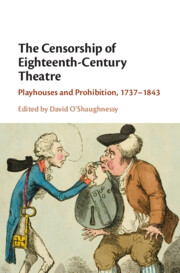Book contents
- The Censorship of Eighteenth-Century Theatre
- The Censorship of Eighteenth-Century Theatre
- Copyright page
- Dedication
- Contents
- Figures
- Contributors
- Acknowledgements
- Abbreviations
- Introduction
- Part I Gender
- Chapter 1 Censorship as Cultural Production
- Chapter 2 Damned Women, or the Disclosures of Censorship
- Chapter 3 Women Writers and Censorship in the Early Nineteenth Century
- Part II Politics
- Part III Performance
- Bibliography
- Index
Chapter 1 - Censorship as Cultural Production
The 1752 Public Entertainments Act and Christopher Smart’s Old Woman’s Oratory
from Part I - Gender
Published online by Cambridge University Press: 03 August 2023
- The Censorship of Eighteenth-Century Theatre
- The Censorship of Eighteenth-Century Theatre
- Copyright page
- Dedication
- Contents
- Figures
- Contributors
- Acknowledgements
- Abbreviations
- Introduction
- Part I Gender
- Chapter 1 Censorship as Cultural Production
- Chapter 2 Damned Women, or the Disclosures of Censorship
- Chapter 3 Women Writers and Censorship in the Early Nineteenth Century
- Part II Politics
- Part III Performance
- Bibliography
- Index
Summary
Christopher Smart’s drag orations as Mary Midnight were enabled by burgeoning British social policy legislation combined with widespread cultural aspirations for creating an educated British public through public oratory. Ironically, the state censorship enacted in the 1752 Public Entertainments Act, which sought to limit public performances outside the licensed London theatres, created conditions that enabled Smart’s innovative attempts at entertaining—and therefore creating—a public unified across class and gender differences through a mixture of humor, erudition, dance, and music, among other forms of performances (including trained dog and monkey acts). The case of Smart’s Mary Midnight is key to understanding the achievements and limits of a British urban entertainment industry in the mid eighteenth century that was dedicated to creating a civil public sphere, as well as making money.
- Type
- Chapter
- Information
- The Censorship of Eighteenth-Century TheatrePlayhouses and Prohibition, 1737–1843, pp. 33 - 51Publisher: Cambridge University PressPrint publication year: 2023

